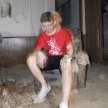War Through The Eyes of a Child
Personal memoir while living in Venezuela

I was about eleven or twelve years old and things had all been getting worse. It still dents the back of my head. Things had always been bad. People had always wanted to escape this city, but this time it was different. The streets of the city, full of life, suddenly seemed to darken and gather with people of all kinds opening trash bags to eat for the day. I knew there was something wrong. I remember the sky looking gray and hazy, almost polluted. The same way it does when there’s a wildfire.
“Papá, what's going on? Why are people eating trash out in the streets? Is it true they killed the president? Papá, what's going on? I demanded.
Silence, silence coupled with the eerie screeching of the city heard from the balcony of the thirteenth floor. My dad stood there, scrolling through his phone and looking up, still, and not saying a word.
The next day, in the very morning, laying on my bed, I noticed how the city woke up exasperated, Caracas yelled in pain and I ran to my window to grasp onto the concrete and get a sense of what had woken me up. The avenue right in front of the apartment was flooded with people. Countless little dots that resembled ants trying to escape after a little kid has flooded their anthill.
“FREEDOM, FREEDOM. WE HAVE NO ELECTRICITY, WE HAVE NO RUNNING WATER, WE HAVE NO FOOD!” Chanted the masses.
Soon enough, dozens of white tanks and tiny green men and women showed up to the demonstration. I wanted to get out, I was eager to go down and help them in any way I could, but I was demanded to tuck my head down and avoid windows. Then the fire commenced. I could still peek my head through the lower window and in between the curtains. People were fleeing the scene at the rhythm of the gunshots that had an uncanny echo to them, each bullet having no regard for their lives.
Policemen and the military went ahead and did everything in their power to bury our freedom. They ran over people, shot at little kids on the streets, and had no mercy for any of us. And when people responded, it got even more dreadful. This was not a fight for more freedom or change, but also basic human rights and a voice amid chaos.
Some ladies on the first floor opened the gates to let people shelter themselves inside the lobby of the nearby apartments. They ran and reached as fast as they could into any crevice there was, but once the military realized what was happening, they plunged into the gates with the trucks and the glass panels of the lobby of our building, letting themselves in and going up the stairs. Hunting, shooting, and releasing toxic gas inside the structure and making even more damage to our morals as a nation. Not even our own little home was safe anymore.
The aftermath was always the worst part. Deserted roads among barricades. Used canisters and bombshells resting on the grass and, unclaimed dead bodies laying on benches and sidewalks. Their faces usually destroyed by a mix of teargas and bullets shot directly to their face.
They were mothers, sons, fathers, daughters, and students. Nobody was going to get them back and, it generated great outrage in the country. Shrines honoring the young kids that died in the protests could be found across the whole city. But when you turned on the news, the government-run national approved news at least, they dismissed the whole situation.
For months it all remained the same, and when the government successfully killed enough of us and scared everyone else that, nobody wanted to even dare come out the door, the situation was kept unchanged. People were dying every day because of famine, censorship on TV and online, people eating out of the trash in the streets, no medicines available or hospitals working. But they had killed thousands, and there was nothing we could do about it.
It shaped me as a little kid, and once I got to escape the vast force of the “Chavista Socialism,” I realized that things didn’t have to be that way. Several times now I get asked:
“Where are you from?” or “How’s life in Venezuela? Like why did you move here?”
And it is no wonder why it is so hard to answer both of those. Three years after fleeing, I feel at home in the states and why did I leave? - Too complicated to explain.
So when I don’t have an answer for you, now you know why.
About the Creator
Jesus Eduardo Lopez Alvarez
This is kind of my personal diary, writing things in times of despair or awe :)






Comments
There are no comments for this story
Be the first to respond and start the conversation.